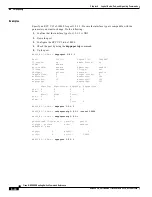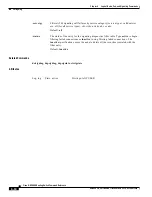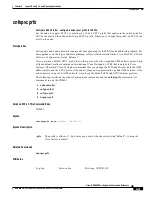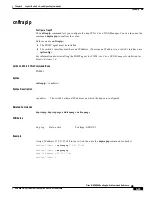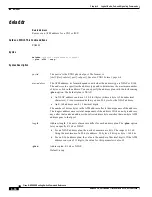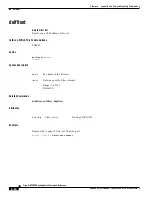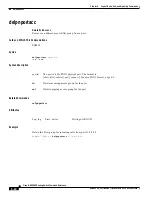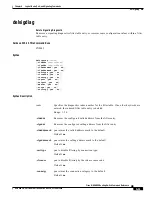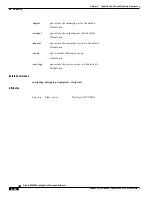
6-56
Cisco MGX 8850 Routing Switch Command Reference
Release 2.0, Part Number 78-10467-04 Rev C0, October 2001
Chapter 6
Logical Node, Port, and Signaling Commands
deladdr
deladdr
Delete Address
Removes an ATM address for a UNI or IISP.
Cards on Which This Command Runs
PXM45
Syntax
deladdr <portid> <atm-address> <length>
[-plan {e164 | nsap}]
Syntax Description
portid
The portid is the PNNI physical port. The format is
[shelf.]slot[:subslot].port[:subport]. See also
PNNI Format, page 6-4
.
atm-address
The ATM address: its format depends on whether the address type is NSAP or E.164.
The address plan specifies the address type and so determines the maximum number
of bytes or bits in the address. You can specify the address plan with the forthcoming
-plan option. The default plan is NSAP.
•
An NSAP address can have 1–20, 8-bit bytes (where a byte is 2 hexadecimal
characters). Cisco recommends that you use 20 bytes for the NSAP address.
•
An E.164 address can 8–15 decimal digits.
The number of bits or bytes in the ATM address effects the uniqueness of the address.
The longest address ensures total uniqueness of the address. With a one-byte address,
any caller that sends an address whose first address byte matches that one-byte ATM
address goes to that port.
length
Address length. The units of measure differ for each address plan. The -plan option
lets you specify E.164 or NSAP.
•
For an NSAP address plan, the units of measure are bits. The range is 0–160.
Using the maximum of a 20-byte address: 20 bytes x 8 bits per byte = 160 bits.
•
For an E.164 address plan, the value is the number of decimal digits. If the ATM
address consists of 15 digits, the value for this parameter is also 15.
-plan
Address plan: E.164 or NSAP.
Default: nsap



